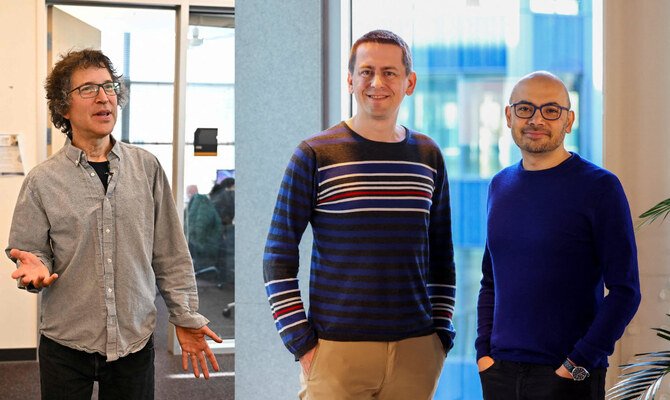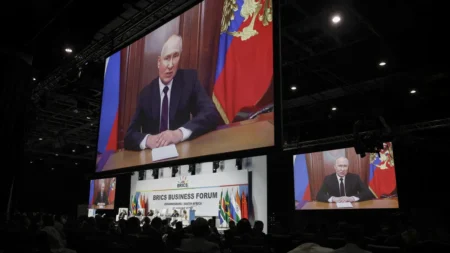Nobel Prize in Chemistry Awarded for Pioneering AI-Driven Protein Design
LONDON: On Wednesday, three scientists who revolutionized the ability to predict and engineer proteins—the essential components of life—were awarded the 2024 Nobel Prize in Chemistry. Their groundbreaking work, which harnessed advanced technologies including artificial intelligence (AI), is set to reshape drug development and other scientific fields.

The Nobel Prize was awarded to David Baker (left), a biochemist from the University of Washington, and Demis Hassabis (center) and John Jumper (right), computer scientists at Google DeepMind, an AI research lab based in London.
Heiner Linke, chair of the Nobel Committee for Chemistry, described their research as a long-sought breakthrough in biochemistry. “This work resolves a challenge that has preoccupied the scientific community for decades,” Linke remarked.
The Science Behind the Award
Proteins are incredibly complex molecules, with each structure—comprised of thousands of atoms—shaping the biological functions they perform. Scientists have long sought efficient ways to build new proteins from scratch to address specific needs, such as medicines or materials.
Baker’s contributions date back to the 1990s when he developed Rosetta, a computational tool that uses data on known proteins to help design new ones that do not naturally exist. “It now seems possible to design virtually any protein using this technology,” said Johan Åqvist from the Nobel committee.
Meanwhile, Hassabis and Jumper’s efforts with AlphaFold, an AI model, achieved a significant milestone by accurately predicting the structure of nearly all 200 million known proteins. Linke noted, “They cracked the code. Through the skillful use of AI, they made it possible to determine the structure of any protein in nature.”
Why This Matters
This breakthrough in protein design holds immense potential for scientific and medical innovation. With the ability to both understand existing proteins and engineer new ones, researchers may soon develop new drugs, create vaccines, or design enzymes to break down environmental waste like plastics.
Baker explained that the technology opens new possibilities for more precise medicines, such as treatments that activate only at specific moments within the body. He cited examples including a nasal spray to halt viral infections like COVID-19 and drugs to disrupt severe inflammatory responses, such as cytokine storms.
Jon Lorsch, a director at the National Institutes of Health (NIH), reflected on the importance of the achievement: “The ability to design previously unseen protein structures has always been the holy grail. This breakthrough takes us one step closer to that vision.”
Reactions from the Laureates
Speaking to the Associated Press, Baker said he received the news of his Nobel win in the early morning. His wife, overwhelmed with excitement, celebrated the moment with joyful screams. “It was a bit deafening,” Baker joked.
Hassabis, one of Britain’s leading tech figures, called the award “an unbelievable honor.” As co-founder of DeepMind, acquired by Google in 2014, he has led multiple AI advancements, including developing an algorithm that mastered the ancient game of Go, defeating the human world champion.
During a press conference, Jumper expressed his disbelief: “It’s surreal and wonderful. I can’t quite process it yet.” He revealed that DeepMind’s AI breakthroughs also influenced Baker’s work. “Their success in protein prediction gave us the inspiration to apply AI in protein design,” Baker acknowledged.
The Role of AI in the Breakthrough
Before AlphaFold, determining the structure of a single protein required months or years of painstaking research. In contrast, AlphaFold can accurately map the structure of proteins within minutes, significantly speeding up scientific research.
“This AI tool has eliminated years of experimental work,” Hassabis explained. “It demonstrates how AI can accelerate scientific discovery.”
Jumper emphasized the transformative impact of their achievement, stating, “This is a key example of how AI can make science faster and more efficient.”
Nobel Recognition and AI’s Future Challenges
This year’s chemistry prize is the second awarded to researchers linked to AI development at Google. On Tuesday, the physics prize was awarded to Geoffrey Hinton, a pioneer in machine learning often referred to as the “godfather of AI.” Hinton, who formerly worked at Google, later left the company to openly discuss AI’s risks.
“I believe AI will bring tremendous benefits, especially in healthcare,” Hinton said in a press briefing. “But it also raises concerns. If we create systems more intelligent than us, controlling them may prove challenging.”
Prize Details and Upcoming Awards
The 2024 Nobel Prize in Chemistry comes with a monetary award of 11 million Swedish kronor (approximately $1 million USD). Baker will receive half of the prize money, while Hassabis and Jumper will share the other half.
The announcement is part of a week of Nobel recognitions. The medicine prize went to American scientists Victor Ambros and Gary Ruvkun on Monday, followed by the physics prize to AI pioneers. The literature prize will be revealed on Thursday, with the Nobel Peace Prize announcement scheduled for Friday. The final award for economics will be announced on October 14.
As per tradition, the laureates will receive their awards on December 10, the anniversary of Alfred Nobel’s death, at a ceremony in Stockholm, Sweden.
Source: NobelPrize.org, chicago tribune






